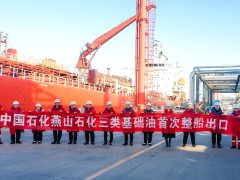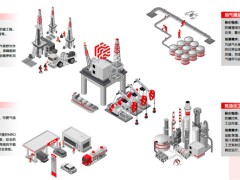据石油世界期刊2月24日里约热内卢报道,巴西石油巨头独立油气生产商Enauta于2月22日表示,该公司重启了位于亚特兰大近海油田的一口生产井,日产量如预期的约为10400桶。
Enauta表示,7-ATL-4HB-RJS油井在更换了通往该井一个油加热器的管道后重新启动。今年1月,Enauta在关闭近3个月后首次尝试重启该油井的生产,但这口井的表现并没有达到预期。
自去年12月前合作伙伴Barra Energia放弃50%的股权后,Enauta公司获得了该油田的100%控制权,此次重新开始生产标志着亚特兰大油田的首个积极进展之一。亚特兰大油田的开发一直受到技术问题和延迟的影响,这些问题抵消了该油田原油的价值。该油田的原油含硫量低,是加工成超低硫柴油(ULSD)和低硫船用燃料的理想选择。
该等级原油的受欢迎程度使得Enauta经常以相对布伦特原油略微折扣的溢价出售。
最新的一系列技术问题始于2020年中期,当时FPSO Petrojarl I浮式生产、存储和卸载船(FPSO)的水处理出现问题,影响了8 - 9月的生产。据Enauta称,FPSO的水处理能力约为6,000桶/日,限制了原油生产。去年11月,Enauta关闭了亚特兰大的生产,作为一项预防措施,因为在检查故障的油加热器时发现水下设备发生腐蚀。
这些加热器是用来保持亚特兰大的高粘度原油从海底流到海面上的浮动生产装置,因为这些原油太稠了,不会从倾斜45度的杯状容器中滴落出来。
据Enauta称,1月26日,在初步维修完成后,该公司曾短暂重启生产,但在设备未能按预期运行后迅速关闭。Petrojarl I FPSO的运营商Teekay Offshore随后承担了对故障设备进行全面置换的任务。
Enauta公司在1月7日发布的产量预测中表示,尽管停工,但预计亚特兰大油田2020年的平均产量约为1.4万桶/天,波动幅度约为10%。
Enauta表示,剩余的维修时间包括更换油田剩余的两口油井的加热器。预计7-ATL-3H-RJS井将在第一季度重启生产,预计初始日产量为1万桶。7-ATL-2HP-RJS井将于2021年年中恢复生产。
Enauta公司还没有披露该油田的最新问题将如何影响公司对该油田的未来计划,特别是在2020年底获得该油田的100%控制权之后。确定生产系统的工作已经进行了多年,但受油价波动、冠状病毒大流行和Barra Energia退出等因素的影响。
据Enauta表示,该最终生产系统将增加9口新生产井和注入井,以及一个新的FPSO,装机产能约为5万-6万桶/天。新FPSO的水处理能力也将超过Petrojarl I FPSO。
郝芬 译自 石油世界期刊
原文如下:
Enauta restarts production well at Santos basin offshore Atlanta Field
Brazilian independent oil and natural gas producer Enauta restarted a single production well at the offshore Atlanta Field, pumping about 10,400 b/d as expected, the company said Feb. 22.
The 7-ATL-4HB-RJS well was restarted after swapping out pipes to one of the well's oil heaters, Enauta said. This was the same well that failed to perform as expected in January, when Enauta first attempted to restart production at the field after a nearly three-month shutdown.
The production restart marks one of the first positive developments at Atlanta since Enauta assumed 100% control of the field in December after former partner Barra Energia relinquished its 50% minority stake. Atlanta's development has been marred by technical troubles and delays that have offset the value of the field's crude, which is highly prized for low sulfur content that makes it ideal for processing into ULSD and low-sulfur bunker fuel.
The grade's popularity has allowed Enauta to often sell cargoes at a premium to slight discount to Brent.
The latest series of technical troubles started in mid-2020, when there were issues with water-processing onboard the FPSO Petrojarl I floating production, storage and offloading vessel that affected production in August-September. Crude oil production was limited by the FPSO's water-processing capacity of about 6,000 b/d, according to Enauta. Enauta then shuttered production at Atlanta as a preventive measure in November, when corrosion was discovered on subsea equipment during inspections of the failed oil heaters.
The heaters are needed to keep Atlanta's highly viscous crude, which is so thick that it won't drip out of a cup sitting tipped at a 45-degree angle, flowing from the seabed to the floating production unit on the surface.
Output was briefly restarted Jan. 26 after initial repairs were completed, but was shuttered quickly after the equipment failed to function as expected, according to Enauta. Teekay Offshore, which operates the FPSO Petrojarl I, was then tasked with a full swap of the faulty equipment.
Enauta expects Atlanta to produce an average of about 14,000 b/d in 2020, with a variation of 10% more or less, despite the downtime, the company said in a production forecast released Jan. 7.
The timeline for remaining repairs, which involve swapping out oil heaters at the field's remaining two production wells, was maintained, Enauta said. The 7-ATL-3H-RJS well is expected to restart production in the first quarter, with initial output of 10,000 b/d expected. The 7-ATL-2HP-RJS well will return to production by the middle of 2021, Enauta said.
Enauta also has not yet disclosed how the latest issues at the field will affect the company's future plans for the field, especially after assuming 100% control at the end of 2020. Work on the definitive production system has been underway for years, but subject to changes related to oil-price volatility, the coronavirus pandemic and Barra Energia's exit.
The definitive production system would add nine new production and injection wells as well as a new FPSO with installed capacity to produce about 50,000-60,000 b/d. The new FPSO would also have more water-processing capacity than the FPSO Petrojarl I, according to Enauta.







